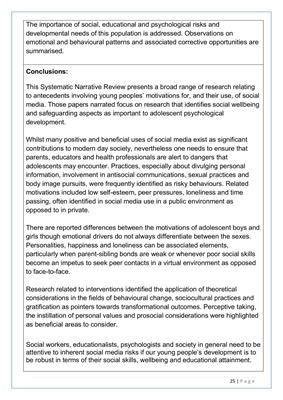
25 | P a g e
The importance of social, educational and psychological risks and
developmental needs of this population is addressed. Observations on
emotional and behavioural patterns and associated corrective opportunities are
summarised.
Conclusions:
This Systematic Narrative Review presents a broad range of research relating
to antecedents involving young peoples' motivations for, and their use, of social
media. Those papers narrated focus on research that identifies social wellbeing
and safeguarding aspects as important to adolescent psychological
development.
Whilst many positive and beneficial uses of social media exist as significant
contributions to modern day society, nevertheless one needs to ensure that
parents, educators and health professionals are alert to dangers that
adolescents may encounter. Practices, especially about divulging personal
information, involvement in antisocial communications, sexual practices and
body image pursuits, were frequently identified as risky behaviours. Related
motivations included low self-esteem, peer pressures, loneliness and time
passing, often identified in social media use in a public environment as
opposed to in private.
There are reported differences between the motivations of adolescent boys and
girls though emotional drivers do not always differentiate between the sexes.
Personalities, happiness and loneliness can be associated elements,
particularly when parent-sibling bonds are weak or whenever poor social skills
become an impetus to seek peer contacts in a virtual environment as opposed
to face-to-face.
Research related to interventions identified the application of theoretical
considerations in the fields of behavioural change, sociocultural practices and
gratification as pointers towards transformational outcomes. Perceptive taking,
the instillation of personal values and prosocial considerations were highlighted
as beneficial areas to consider.
Social workers, educationalists, psychologists and society in general need to be
attentive to inherent social media risks if our young people's development is to
be robust in terms of their social skills, wellbeing and educational attainment.